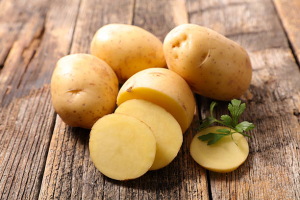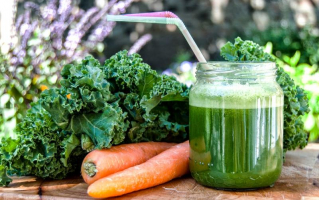Top 6 Health Benefits of Sweet Potato
The sweet potato is a starchy root vegetable with a sweet flavor. It features a thin, brown exterior skin and brightly colored flesh, which is most typically ... read more...orange, although other colors include white, purple, and yellow. Sweet potatoes can be eaten whole or peeled, and the plant's leaves are also edible. They have a lot of benefits for your health. Read on for more information.
-
The nutrition facts for 3.5 ounces (100 grams) of raw sweet potatoes are:
- Calories: 86
- Water: 77%
- Protein: 1.6 grams
- Carbs: 20.1 grams
- Sugar: 4.2 grams
- Fiber: 3 grams
- Fat: 0.1 grams
A medium sweet potato (cooked without the skin) has 27 grams of carbohydrates. The primary components are starches, which account for 53% of the carb content. Simple sugars including glucose, fructose, sucrose, and maltose account for 32% of the carb content. Sweet potatoes have a glycemic index (GI) ranging from 44 to 96. The GI is a measurement of how quickly your blood sugar levels rise after eating.
Cooked sweet potatoes are abundant in fiber, with 3.8 grams in a medium-sized sweet potato. The fibers are soluble (15-23%) in the form of pectin and insoluble (77-85%) in the forms of cellulose, hemicellulose, and lignin. Soluble fibers, such as pectin, may promote satiety, decrease food intake, and lower blood sugar rises by delaying sugar and starch digestion.
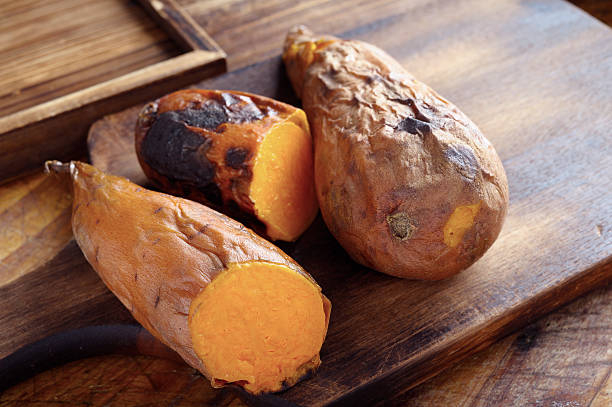
High in nutrients 
High in nutrients -
A medium-sized sweet potato has only 2 grams of protein, making it a poor source of protein. Sweet potatoes include sporamins, which are distinct proteins that account for more than 80% of their total protein composition. When the plant is physically damaged, the sporamins are generated to aid in healing. According to recent studies, they may have antioxidant effects. Sweet potatoes, despite their low protein content, are a significant supply of this macronutrient in many underdeveloped nations.
Sweet potatoes are high in beta carotene, vitamin C, and potassium. Sweet potatoes have a high concentration of beta carotene, which your body can convert to vitamin A. This vegetable has the necessary daily amount of this vitamin in just 3.5 ounces (100 grams). Sweet potatoes are high in beta carotene, vitamin C, and potassium. They also provide a good supply of many other vitamins and minerals.

High in protein and vitamins 
High in protein and vitamins -
The deficiency of vitamin A, which plays a key function in your body, is a huge public health concern in many underdeveloped nations. Deficiency can cause both acute and permanent eye damage, and can even result in blindness. It can also depress immunological function and raise mortality rates, particularly in youngsters and pregnant or lactating women. Sweet potatoes are abundant in highly absorbable beta carotene, which your body can convert to vitamin A.
The intensity of the sweet potato's yellow or orange hue is directly related to its beta carotene level. Because they contain a highly absorbable form of vitamin A, orange sweet potatoes have been proven to enhance blood levels of this nutrient more than other beta carotene sources. As a result, eating sweet potatoes is a great technique for preventing vitamin A deficiency in impoverished nations.

Prevention of vitamin A deficiency 
Prevention of vitamin A deficiency -
Type 2 diabetes is distinguished by an imbalance in blood sugar levels and insulin production. Caiapo, a variety of sweet potatoes with white skin and meat, may help persons with type 2 diabetes alleviate their symptoms. This sweet potato may not only lower fasting blood glucose and LDL (bad) cholesterol levels, but it may also boost insulin sensitivity. The existing evidence, however, does not support the use of sweet potatoes in the treatment of type 2 diabetes.
Sweet potatoes may be considered overly starchy by some, but their high fiber content makes them a slow-burning carbohydrate, which means they won't increase blood sugar and insulin levels. One cup of baked sweet potato has around 6 grams of fiber, which is more than one-quarter of the daily recommended amount.

Improved blood sugar regulation 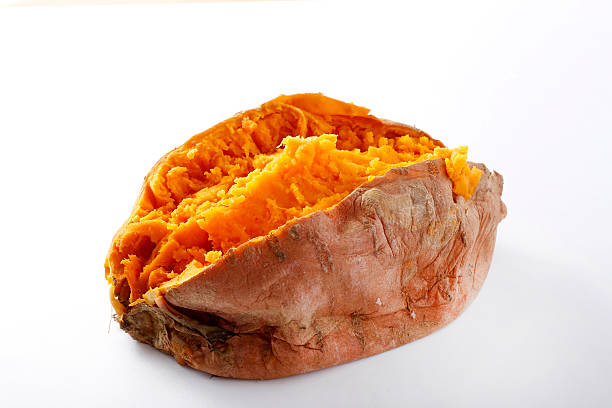
Improved blood sugar regulation -
Cell oxidative damage is frequently linked to an increased risk of cancer, which arises when cells divide uncontrolled. Antioxidant-rich diets, such as carotenoids, have been linked to a decreased incidence of stomach, kidney, and breast cancer. According to research, the high antioxidant content of sweet potatoes may lower your risk of cancer. Purple potatoes are the most antioxidant-rich.
While there are no "superfoods" that may prevent cancer and many cancer risk factors are unrelated to diet, there is evidence that eating a balanced diet helps lower the risk of cancer. Fruits and vegetables are strong in antioxidants, which are substances that help protect the body from 'free radical' damage. According to research, the antioxidants in the peel of sweet potatoes, particularly purple sweet potatoes, may help minimize this oxidation process, lowering the risk of cancer. To get the most nutrients out of your sweet potatoes, don't peel them; instead, clean them thoroughly before cooking.

May reduce the risk of cancer 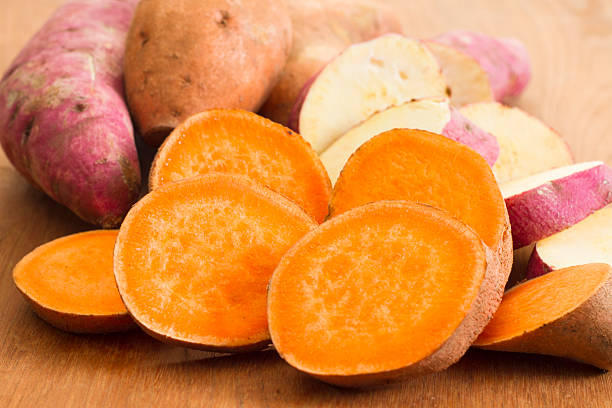
May reduce the risk of cancer -
Sweet potatoes include a lot of fiber, which has been proved to help with digestion. Much of the study has been done on animals, but it appears that high amounts of plant sterols (phytosterols) in sweet potatoes may have a protective impact on the digestive tract and may be effective in the prevention and treatment of duodenal and gastric ulcers, especially those caused by NSAIDs (non-steroidal anti-inflammatory drugs, such as ibuprofen).
Sweet potatoes are high in beta-carotene, which is responsible for their vivid orange flesh. When you consume beta-carotene, your body converts it to vitamin A, which is subsequently employed in the formation of light-detecting receptors in the eye. This is essential for night vision and sustaining eye health. According to Food & Nutrition Research research, purple sweet potatoes contain anthocyanins, a kind of antioxidant that has been demonstrated to help the eyes.

May support digestive health and eye health 
May support digestive health and eye health








